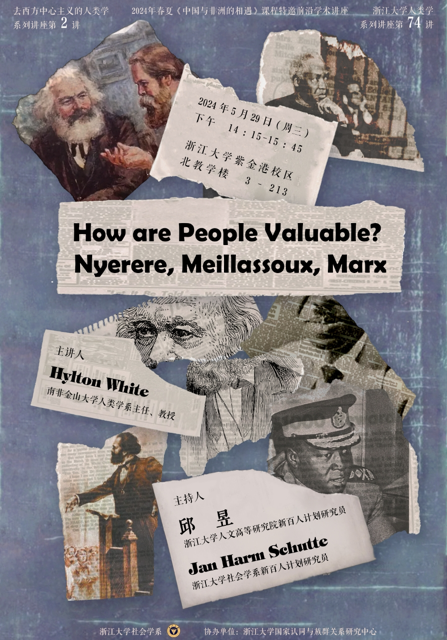
2024年春夏《中国与非洲的相遇》课程
特邀前沿学术讲座
“去西方中心主义的人类学”系列讲座第2讲
浙大人类学系列讲座第74讲
讲 座 信 息
主题:Hylton White: How are People Valuable?
时间:2024年5月29日(周三)14:15-15:45
地点:浙江大学紫金港校区北教学楼3-213
线上:腾讯会议:707-633-984(密码:6347)
主办:浙江大学社会学系 浙江大学人类学研究所
协办:浙江大学国家认同与族群关系研究中心
概要:Among the core concepts created by the anthropology of Africa is the concept of wealth-in-people: the notion that people are riches, no less than goods and currencies are, and sometimes even more so. To put it otherwise, a person is wealthy not only insofar as they have produce, money, and other such non-human means of exchange or stores of value, but also insofar as they have people. Inspired by the literature on this concept, I revisit work by three thinkers in the socialist tradition who have explored the idea that people become valuable insofar as they can labour to produce material goods. These three are: 1) Tanzanian independence leader Julius Nyerere, who argued that the people of Africa represented a resource for national development that sidestepped the need for money; 2) Claude Meillassoux, the French-Marxist anthropologist who argued that precolonial African societies were founded on the reproduction of labour-power through the accumulation of productive people; and 3) Marx himself, who argued that the valuation of persons as vessels of labour-power is unique to capitalist society. I argue that Marx’s restriction of the concept of labour-power to capitalist society is instructive, and that one should be wary of transposing it into non-capitalist modes of production and their corresponding modes of evaluation. In non-capitalist societies, the value of human persons might be created through the production of diverse kinds of personhood and relationship, rather than through their recruitment for the production of material wealth.
主讲人:Hylton White
南非金山大学人类学系主任、教授。主要研究方向为去殖民主义、亲属、人类学理论等。
主持人:邱昱
浙江大学人文高等研究院新百人计划研究员
主持人:Jan Harm Schutte
浙江大学社会学系新百人计划研究员